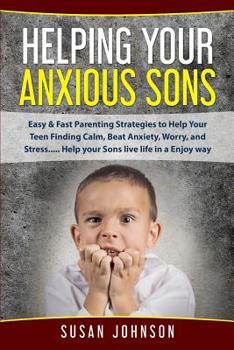Helping Your Anxious Sons: Easy & Fast Parenting Strategies to Help Your Teen Finding Calm, Beat Anxiety, Worry, and Stress..... Help your Sons l
Helping Your Anxious Sons: Children who experience worry and anxiety should tell you how they sense, but only when they are not frightened of becoming embarrassed, humiliated or punished. Parents face particular challenges due to the fact children with anxiety tend to be nervous, avoidance, annoying or exhausting. If you become frustrated and make these children feel bad, they cease growing honest and begin telling you that they are tired, unwell, or don't care. Without having real improvement, stressed and nervous children will try to keep away from experiencing anything terrible. A lot start to avoid circumstances where there is only a small likelihood they will end up feeling bad. Eventually, they end up making options based mostly on feared situations and not realities. If this remains, quite a few of these children will try to make new friends who could help them feel better. But in most cases they lead to mastering escaping the problems using isolation, skipping school, becoming a member of "fringe" groups, looking for thrills, rejecting responsibility socially, or using alcohol and other drugs. In time, children and anxiety begin to express rage instead of their concern. Anger feels better than fear, and it is simpler for children to blame others if they can't escape feeling bad.
On the other hand, blaming themselves instead of others leads to depression. Children reinforce and offer supremacy to their fears once they act to stay away from or escape unrealistic worries. This way the anxiousness grows. The child's self-confidence will malfunction to blossom at home and in school.
What you will learn in this book:
It is an unfortunate but authentic truth that stress and nervousness in children and anxiety is a common issue in this day's fast-paced, high-tech, activity-packed culture. If your child is experiencing fear and nervousness, try these uncomplicated but efficient approaches to reduce anxiety in children.





